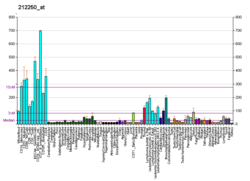
MTDH
Metadherin, also known as protein LYRIC or astrocyte elevated gene-1 protein (AEG-1) is a protein that in humans is encoded by the MTDH gene.
Function
MTDH (AEG-1) is involved in HIF-1alpha mediated angiogenesis. MTDH also interacts with SND1 and involved in RNA-induced silencing complex (RISC) and plays very important role in RISC and miRNA functions. MTDH has been shown to interact with spliceosome proteins in the cell nucleus and regulate the process of alternative splicing.
MTDH induces an oncogene called Late SV40 factor (LSF/TFCP2) which is involved in thymidylate synthase (TS) induction and DNA biosynthesis synthesis. Late SV40 factor (LSF/TFCP2) enhances angiogenesis by transcriptionally up-regulating matrix metalloproteinase-9 (MMP9).
Clinical significance
MTDH acts as an oncogene in melanoma, malignant glioma, breast cancer and hepatocellular carcinoma. It is highly expressed in these cancers and helps in their progression and development. It is induced by c-Myc oncogene and plays an important role in anchorage independent growth of cancer cells (metastasis).
Elevated expression of MTDH, which is overexpressed in more than 40% of breast cancers, is associated with poor clinical outcomes. MTDH has a dual role in promoting metastatic seeding and enhancing chemoresistance. MTDH is therefore a potential therapeutic target for enhancing chemotherapy and reducing metastasis.
MTDH has been shown to be overexpressed in prostate cancer, where there is a shift towards a more cytoplasmic localisation, signalling a poor prognosis. In the nucleus of prostate cancer cells, MTDH has been shown to affect alternative splicing of genes such as CD44, which may also be associated with prostate cancer progression.
LSF/TFCP2 plays a multifaceted role in chemo resistance, EMT, allergic response, inflammation and Alzheimer’s disease.
MTDH controls many hallmarks of oncogenes and cancer. MTDH/AEG-1 induces hepato steatosis in mouse liver. MTDH knockdown by artificial microRNA interference functions as a potential tumor suppressor in breast cancer. Astrocyte elevated gene-1/MTDH undergoes palmitoylation in normal and abnormal cell physiology. Biomaterial titanium substrata with microgrooves can alter MTDH expression in human primary cells.
Interactions
MTDH has been shown to interact with:
Further reading
- Emdad L, Sarkar D, Su ZZ, Lee SG, Kang DC, Bruce JN, et al. (May 2007). "Astrocyte elevated gene-1: recent insights into a novel gene involved in tumor progression, metastasis and neurodegeneration". Pharmacology & Therapeutics. 114 (2): 155–70. doi:10.1016/j.pharmthera.2007.01.010. PMC 2039930. PMID 17397930.
- van 't Veer LJ, Dai H, van de Vijver MJ, He YD, Hart AA, Mao M, et al. (January 2002). "Gene expression profiling predicts clinical outcome of breast cancer". Nature. 415 (6871): 530–6. doi:10.1038/415530a. hdl:1874/15552. PMID 11823860. S2CID 4369266.
- Sutherland HG, Lam YW, Briers S, Lamond AI, Bickmore WA (March 2004). "3D3/lyric: a novel transmembrane protein of the endoplasmic reticulum and nuclear envelope, which is also present in the nucleolus". Experimental Cell Research. 294 (1): 94–105. doi:10.1016/j.yexcr.2003.11.020. PMID 14980505.
- Brown DM, Ruoslahti E (April 2004). "Metadherin, a cell surface protein in breast tumors that mediates lung metastasis". Cancer Cell. 5 (4): 365–74. doi:10.1016/S1535-6108(04)00079-0. PMID 15093543.
- Britt DE, Yang DF, Yang DQ, Flanagan D, Callanan H, Lim YP, et al. (October 2004). "Identification of a novel protein, LYRIC, localized to tight junctions of polarized epithelial cells". Experimental Cell Research. 300 (1): 134–48. doi:10.1016/j.yexcr.2004.06.026. PMID 15383321.
- Kang DC, Su ZZ, Sarkar D, Emdad L, Volsky DJ, Fisher PB (June 2005). "Cloning and characterization of HIV-1-inducible astrocyte elevated gene-1, AEG-1". Gene. 353 (1): 8–15. doi:10.1016/j.gene.2005.04.006. PMID 15927426.
- Olsen JV, Blagoev B, Gnad F, Macek B, Kumar C, Mortensen P, Mann M (November 2006). "Global, in vivo, and site-specific phosphorylation dynamics in signaling networks". Cell. 127 (3): 635–48. doi:10.1016/j.cell.2006.09.026. PMID 17081983. S2CID 7827573.
- Lee SG, Su ZZ, Emdad L, Sarkar D, Fisher PB (November 2006). "Astrocyte elevated gene-1 (AEG-1) is a target gene of oncogenic Ha-ras requiring phosphatidylinositol 3-kinase and c-Myc". Proceedings of the National Academy of Sciences of the United States of America. 103 (46): 17390–5. Bibcode:2006PNAS..10317390L. doi:10.1073/pnas.0608386103. PMC 1859939. PMID 17088530.





